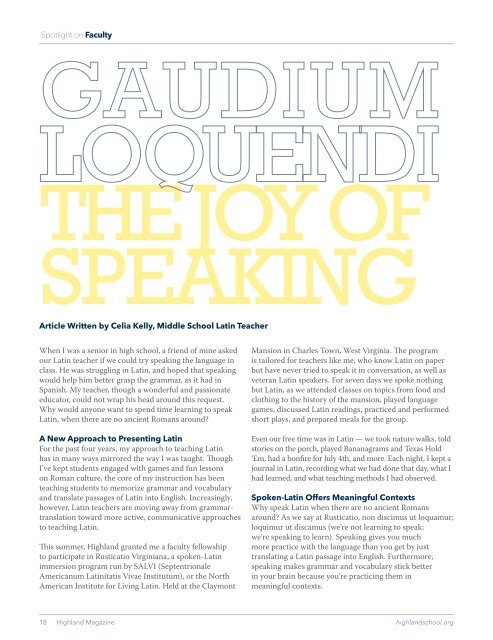HIGHLAND
Create successful ePaper yourself
Turn your PDF publications into a flip-book with our unique Google optimized e-Paper software.
Spotlight on Faculty<br />
THE JOY OF<br />
SPEAKING<br />
Article Written by Celia Kelly, Middle School Latin Teacher<br />
When I was a senior in high school, a friend of mine asked<br />
our Latin teacher if we could try speaking the language in<br />
class. He was struggling in Latin, and hoped that speaking<br />
would help him better grasp the grammar, as it had in<br />
Spanish. My teacher, though a wonderful and passionate<br />
educator, could not wrap his head around this request.<br />
Why would anyone want to spend time learning to speak<br />
Latin, when there are no ancient Romans around?<br />
A New Approach to Presenting Latin<br />
For the past four years, my approach to teaching Latin<br />
has in many ways mirrored the way I was taught. Though<br />
I’ve kept students engaged with games and fun lessons<br />
on Roman culture, the core of my instruction has been<br />
teaching students to memorize grammar and vocabulary<br />
and translate passages of Latin into English. Increasingly,<br />
however, Latin teachers are moving away from grammartranslation<br />
toward more active, communicative approaches<br />
to teaching Latin.<br />
This summer, Highland granted me a faculty fellowship<br />
to participate in Rusticatio Virginiana, a spoken-Latin<br />
immersion program run by SALVI (Septentrionale<br />
Americanum Latinitatis Vivae Institutum), or the North<br />
American Institute for Living Latin. Held at the Claymont<br />
Mansion in Charles Town, West Virginia. The program<br />
is tailored for teachers like me, who know Latin on paper<br />
but have never tried to speak it in conversation, as well as<br />
veteran Latin speakers. For seven days we spoke nothing<br />
but Latin, as we attended classes on topics from food and<br />
clothing to the history of the mansion, played language<br />
games, discussed Latin readings, practiced and performed<br />
short plays, and prepared meals for the group.<br />
Even our free time was in Latin — we took nature walks, told<br />
stories on the porch, played Bananagrams and Texas Hold<br />
‘Em, had a bonfire for July 4th, and more. Each night, I kept a<br />
journal in Latin, recording what we had done that day, what I<br />
had learned, and what teaching methods I had observed.<br />
Spoken-Latin Offers Meaningful Contexts<br />
Why speak Latin when there are no ancient Romans<br />
around? As we say at Rusticatio, non discimus ut loquamur;<br />
loquimur ut discamus (we’re not learning to speak;<br />
we’re speaking to learn). Speaking gives you much<br />
more practice with the language than you get by just<br />
translating a Latin passage into English. Furthermore,<br />
speaking makes grammar and vocabulary stick better<br />
in your brain because you’re practicing them in<br />
meaningful contexts.<br />
18 Highland Magazine highlandschool.org




